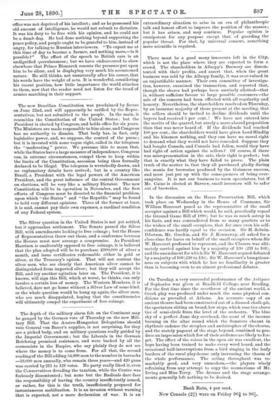The new Brazilian Constitution was proclaimed by decree on June
22nd, and will apparently be ratified by the Repre- sentatives, but not submitted to the people. In the main, it resembles the Constitution of the United States ; but the President is elected by Congress, and holds office for six years. The Ministers are made responsible to him alone, and Congress has no authority to dismiss. That body has, in fact, only legislative power, and, we suppose, the control of the purse ; but it is invested with some vague right, called in the telegram the " moderating " power. We presume this to mean that, while the States have a large measure of independence, Congress can, in extreme circumstances, compel them to keep within the limits of the Constitution, secession being thus formally declared to be illegal. The telegram is wretchedly drawn, and no explanatory details have arrived; but in a country like Brazil, a President with the legal powers of the American President, and the great influence of the central Government on elections, will be very like a military Dictator. The new Constitution will be in operation in November, and the first efforts of Congress must be directed to the financial problem, upon which " the States " and " the Republic " may be found to hold very different opinions. Three of the former at least, it is said, cannot pay their own expenses, a cardinal condition of any Federal system.


















































 Previous page
Previous page